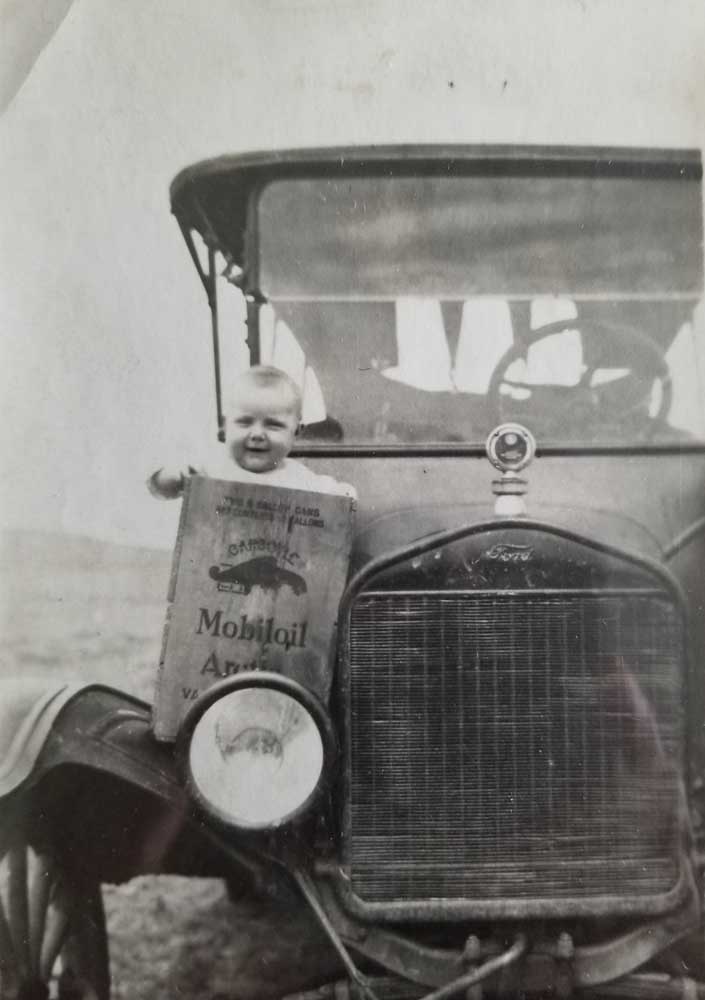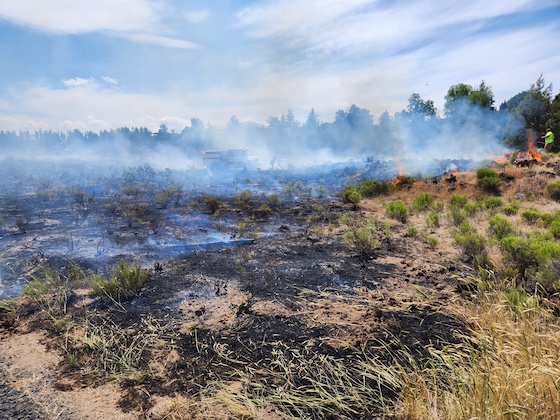WW II vet, former Redmond mayor reaches 100
Published 12:00 am Wednesday, May 8, 2019

- Future Redmond Mayor Gerold Barrett in a sack as his family moves west from Omaha, Nebraska. (submitted photo/Rebecca Barrett)
A man who oversaw some historic milestones for Redmond just reached a personal milestone.
Gerold Barrett, who was mayor from 1969 to 1973, when the city had around 3,700 residents, turned 100 on May 1. The World War II veteran was also known as a Christian public speaker and worked in logging, ranching and insurance.
Redmond’s first stoplight was among the things implemented during Barrett’s two terms. So seeing the city reach 30,000 residents is quite a change.
“It boggles my mind,” Barrett said of the growth.
Early life
After being born in 1919 in Nebraska, Barrett moved with his family to Montana, where his father was an oil wildcatter. They then moved to Salem, where his father worked as an auto mechanic. The Barretts got involved with logging when his father became an early adopter of hauling logs out of the forest on trucks.
“Pre-high school days, he helped his dad at night,” said Barrett’s son, Bruce Barrett, 65.
“As he got older and could drive a truck, he started driving a truck for his dad.”
Barrett enlisted in the Army around the time of the attack on Pearl Harbor, starting boot camp Dec. 28, 1941.
Barrett, under the command of Gen. George S. Patton, served in North Africa and Italy as a commando. Bruce said his dad did “preliminary things,” like establishing roads, clearing mines and identifying the enemy.
“In the days, before they had the Green Berets, they called them the commandos,” Bruce said.
Barrett reached the rank of sergeant major during his nearly five years in the Army, he said.
After the war, Barrett went to work with his father in Prineville, where his father bought a ranch. But with the logging business going strong, he jumped at the chance to get back into it.
Barrett had three children with wife Delpha, who he married in 1950. They remained together until her death over 60 years later.
What started off as hauling logs from the Ochoco Mountains to the Hudspeth Mill in Prineville, ended up with Barrett working as a logging contractor and owning his own mills throughout Northern California.
“He was a smaller logger, and it became increasingly difficult to get lumber for his mill,” Bruce said.
The mayor
Barrett moved back to Redmond in 1965 to help his ailing father on his ranch. He also became an insurance agent.
“It was a complete change from logging to being a salesman,” Bruce said.
Barrett also worked as a track steward at a horse-racing track in Prineville, collecting all the money wagered and turning it over to the state racing commission.
He got involved in the community, working with the Rotary Club and the Redmond Chamber of Commerce. Barrett served on the Redmond City Council before deciding to run for the top elected job in the city.
“I saw the need of some direction,” he said.
Barrett won the election by a slim margin, Bruce recalls.
“He was a public kind of a person,” he said.”They could see he had leadership skills.”
Putting in the traffic signal at SW Highland Avenue and SW Sixth Street was one of the more noticeable things to take place during Barrett’s time in office.
“The citizens were mad about having wrecks all the time on the main highway coming through the city,” he said.
But it was far from the only significant achievement. Barrett was in office when the city ensured it would control land around Redmond Municipal Airport, allowing for the growth that has kept the regional airport in the city to this day.
Barrett also went to Washington, D.C., where he helped secure $8 million in federal funds, a considerable amount at the time, for a sewer system, something that had been a challenge because of the lava rock under the city.
“That’s kind of what he’s all about,” Bruce said, “seeing what the needs are and providing some leadership to accomplish it.”
Barrett also hired Ed English as Redmond’s first city manager. He said he came across English on a trip to Washington state, when English was looking to leave the city he’d been working in.
“I hired him right there on the spot,” Barrett said. “He came down and moved his family down.”
While Redmond had a public utilities manager previously, Bruce said the city manager was able to better watch over the city’s business.
Barrett worked with Bend to get state and federal money to expand Highway 97 to four lanes between the two cities, said Rebecca Barrett, his daughter-in-law.
Barrett also helped get Redmond its first industrial park near the current site of Central Oregon Community College’s Redmond Campus. The first business to come in was an upholstery shop.
The taxes made off the industrial park allowed Redmond to recruit new businesses to town, helping what had previously been a largely agricultural economy, Bruce said.
“Dad knew we had to have diversification to grow the economy,” he said.
Barrett, who became a Christian in the 1950s, started the annual mayor’s prayer breakfast, as well as the tradition of having a clergy member lead a prayer before council meetings, Bruce said.
Later days
While many in the community wanted to see him run for another term, Barrett was worn out and retired from politics.
He moved his insurance company (and himself) to Bend for a while, but returned to run the ranch when his mother died. He retired from insurance in the mid-1980s but continued to work the ranch until selling it in 2006, when he moved back into Redmond.
Barrett also continued with public speaking, which he started in the 1950s. He talked to churches and meetings about how a lumberjack became a Christian.
The work took Barrett across the country and as far away as South America, where he once spent 45 days doing missionary work with the Huaorani, or Auca, people in Ecuador, a tribe known for violence. But most speaking engagements were in California and Oregon.
“We went out most weekends and traveled with him to all these special events,” Bruce said.
Barrett has slowed down a bit. His feet aren’t what they used to be and he has an implant in his back, which he’s had problems with since 15 soldiers landed on him during the war.
“He doesn’t have the physical ability to do what he wants to do, but he still has enough energy for three people,” Bruce said.
Barrett had a birthday celebration April 28 at Foundry Church in Bend, where Barrett celebrated with about 50 people who attended the church with him. Another family celebration was planned for May 4, with family coming in from across the United States and even Canada.
— Reporter: 541-548-2186, gfolsom@redmondspokesman.com






